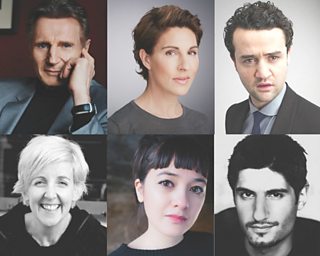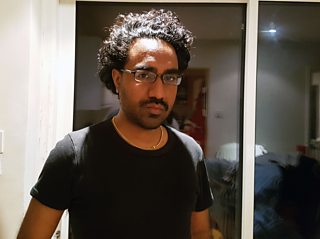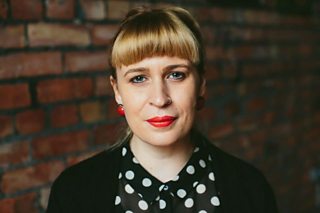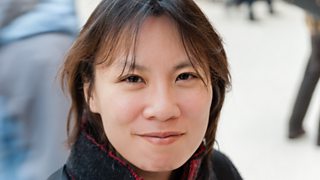Liam Neeson and Tamsin Greig among acting stars in new Radio 3 monologues for ±«Óãtv Music Day

Six short monologues have been co-commissioned by and ±«Óãtv Writersroom to mark ±«Óãtv Music Day 2017. Each is based on this year’s ±«Óãtv Music Day theme The Power of Music, the specially-commissioned works by new writers are broadcast throughout the day on Radio 3 on 15 June 2017.
Listen to all 6 monologues below
The monologues’ topics range from an unbeaten boxer being confronted with Brahms’s Lullaby during his last fight, to a broken man coaxed back to life by hearing Bach’s St Matthew Passion over a tube station tannoy and an orchestral clarinettist breaking rank for an unexpected solo.
This project, a collaboration between ±«Óãtv Radio 3 and ±«Óãtv Writersroom - gives six emerging writers their first commissions from the ±«Óãtv. Salim Allybokus, Jan Carson, Ross Dunmore, Emily De Dakis, Grace Knight and Amy Ng were each tasked with creating a five minute monologue. The works are performed by Liam Neeson, Kayvan Novak, Tamsin Greig, Julie Hesmondhalgh, Sophie Wu and Daniel Mays.
The six monologues include:
The Boxer’s Epiphany
Brahms’s Lullaby is an unwelcome guest in the boxing ring for a boxer at his final fight lulled into an epiphany. In this comic piece, the first ±«Óãtv commission for writer Salim Allybokus, Kayvan Novak stars as an unbeaten boxer, delivering the final blows of his last fight when he is visited by the unwelcome sound of Johannes Brahms’s well-known piece Lullaby Op.49 No.4
UnRaveling
Liam Neeson stars as a world class concert pianist who is reduced by dementia, playing whatever he can still manage for friends and family. When he stretches for Ravel’s Concerto in C his thoughts unravel and yet his fingers hold their own memories. This poetic piece is written by Jan Carson, a Northern Irish writer new to the ±«Óãtv.
Pianist: Lauryna Sableviciute
Movement
In the briefest of silences between the movements of Stravinsky’s Petruhska, Portia’s new relationship with Mark is exposed for what it truly is, and things will never be the same again. This new commission by Scottish writer Ross Dunsmore stars Sophie Wu.
Orchestral Groupies With Shaved Heads
The lead clarinettist of the Northern Ireland Philharmonic is in for it: She’s shocked everyone by disrupting a concert with a Saint-SaÑ‘ns Clarinet Sonata in E-Flat Major solidarity solo. She did it for her groupies. Tamsin Greig stars in this offbeat and moving love story by Northern Irish writer Emily DeDakis.
After Exile
Julie Hesmondhalgh stars as upbeat, eccentric Rosheen, who has been dealing with her encroaching hearing loss with characteristic ebullience, and has reconciled herself to a life without the music and socialising she used to love. But then she hears it - loud and clear - Boccherini’s La Musica Notturna Delle Strade di Madrid. This earworm starts to transform her relationship with hearing loss… and her friend Roger. This is a celebratory piece by writer Grace Knight.
Kilburn Passion
Daniel Mays stars as a man, beaten and broken. Tam is coaxed back to life by his own memories when he hears Bach’s St Matthew Passion playing over the tannoy in Kilburn underground station. This complex piece is written by Amy Ng.
The monologues have been developed and produced by Writersroom and all six writers have come through Writersroom development schemes and initiatives.
The Writers

Salim Allybokus
I’m a new comedy writer and part of the ±«Óãtv Writersroom’s comedy development scheme. My monologue, ‘The Boxer’s Epiphany’, tells the story of a clinical, brutal boxer who experiences a sudden and unexpected moment of empathy for his opponent over ‘Lullaby’ by Brahms. When considering the ‘transformative power of music’, I wanted to focus on music’s association with identity. I was also keen to take an ostensibly simple piece of music and build a contrastingly complex, internal, psychological struggle around it. When trying to introduce a comedy element to the piece, I wanted to emphasise that juxtaposition of a vicious fighter who is somehow emasculated by the gentle chimes of ‘Lullaby’.
As a new writer who had been used to drafting and editing alone, I found the collaborative process to be an excellent learning experience. Crucially, working with a producer for the first time provided some much-needed objectivity to my writing-process and enabled me to focus on parts that were seemingly funnier in my head than on paper. Furthermore, I was also able to understand how closely the specifics of a writing brief have to be adhered to and the challenge of keeping an idea within that framework. Ultimately, hearing my words brought to life by Kayvan Novak was the most rewarding moment of the whole process and added an additional perspective that I could have never otherwise achieved.

Jan Carson
I’ve been working in literature for a long time and I’m no stranger to the editing process. It can be painful and frustrating. However, it was a joy to work with Justine and her team. All critique was offered alongside incredibly generous encouragement and I’ve felt fully supported throughout the whole process of getting my script from idea all the way through to airing. It’s also been great to feel the team are genuinely excited for you to have your piece developed. There have been quite a few text messages and emails littered with exclamation marks flying backwards and forwards across the pond as we’ve celebrated every little step of the development process. As collaborative experiences go, writing my first radio piece has felt like exactly the right mix of maintaining artistic control and also enjoying the benefits of being part of a super creative, enthusiastic team of people who are passionate about making great radio.
Perhaps, the most exciting part of the journey over the last few months was the moment I discovered that Liam Neeson had agreed to read my monologue. Liam is from the same small town in Northern Ireland as me. I’ve long been an admirer of his work and I’m still reeling that he actually agreed to record my piece. It’s an incredible boost for my artistic career and it feels particularly special to be supported by an artist who’s emerged from a similar background, to achieve incredible and deserved success in his career. I don’t know how Justine managed to pull this one off but she’s clearly a miracle-maker and I am incredibly grateful for all her hard work and appreciate how lucky I am to have been given such a great opportunity.I’m also particularly delighted to have an actor of Liam Neeson’s caliber voice my monologue because the piece engages with such an important, and often ignored topic. My monologue focuses on a concert pianist who has developed Dementia as he attempts, and ultimately struggles, to play a piece by Ravel. Over the last six years I have spent a lot of time working in the arena of arts development for older people, particularly those living with Dementia. I often see how frustrating life can be for people as they face limitations and restrictions on performing tasks which might have seemed simple before diagnosis. The composer Ravel actually suffered from Aphasia, (a linguistic disorder often associated with Dementia), during the last years of his life and struggled to do his own work justice and this impacted our choice of music (Ravel’s Piano Concerto in G). I wanted to honestly reflect the struggles, the triumphs and the incredible dignity of many of the people I work with in this piece and it is an incredible honour, and hopefully a small gift to them, to have the monologue so significantly featured on Radio 3 and read by such a well-loved voice. Thank you ±«Óãtv Writersroom for taking a risk on new writing and new writers. Opportunities like this are the stuff of dreams.

Ross Dunsmore
Growing up I was surrounded by music, my whole family played and when I was a child the piano in our front room rarely ever stopped, as one person finished, the next took over. Only as an adult do I realize how lucky I was to have this. Music, and in particular piano music, continuously filled our house, everything from Chopin and Debussy to Gershwin and Duke Ellington. Whenever I think of my childhood this perpetual soundtrack seems to run in the background, and perhaps as a result music has always evoked memory for me in a way little else can. Music also became a kind of language in our house, a way to connect, to make up after an argument or reach out when words seemed insufficient. My dad would often ask me to come and listen to something he’d just discovered, an interesting chord progression or a surprising harmony, he’d simply play it, I’d simply listen, and this more than anything would work as a bridge. So this is what I wanted to write about, the power of music to transcend language, the power that music has to connect us and build bridges for us in a way that perhaps nothing else can.
Writing and developing this piece through ±«Óãtv Writersroom has been fascinating, with all the Writersroom team helpful way beyond the call of duty. Notes have always been supportive, incisive, and above all useful. The whole process in fact has once again reminded me how, at its best, creating drama is ultimately a deeply collaborative effort. As a writer, staring at a blank sheet of paper in the wee small hours, it’s a comforting thing to remember.

Emily DeDakis
At the Ulster Hall in Belfast, where I live now, the choir seats flank the Mulholland Grand Organ, looking out over the hall just above and behind the orchestra. Sitting up there once for a concert once, in the front row of the stalls, I found myself noticing the players. I’ve played in orchestras – I was a cellist during high school and university in Atlanta and New Orleans, where I grew up. But that tiny collection of details, glimpsed from just above and behind, stuck with me: the players’ tiny mannerisms, whether they smiled at someone across the way, guessing their favourite piece by how they moved, the bald head of one of the clarinettists ... I suddenly envisioned three women with season tickets for the choir stalls, and imagined who they might be watching – and what it means to see and be seen.
It was important for me that ‘Orchestral Groupies with Shaved Heads’ focused purely on the strange wee love story between a musician and her groupies. Not discovering they were long-lost cousins or seeing them as surrogates for an absent mother: just that relationship, forged from afar but in close proximity, and happening entirely through music. I listened over the phone to Tamsin Greig’s recording session. Her performance was a gorgeous shock, like seeing Maura perfectly for the first time. I loved drafting and sharpening the story with the stellar Writersroom team, and playing with the vividness radio allows (as well as knowing what’s too much. Tweet me for a list of rejected wigs!). It’s a gift to have Writersroom active across all five regions of the U.K. now. A friend joked that there are five regions but six Music Day monologues; she said maybe I’m representing the sixth (invisible) region – all the people who come here from elsewhere and stay for a while, or for years, or forever. It’s great being part of ±«Óãtv Music Day on Radio 3, alongside brilliant fellow writers in my adopted home. Music and its stories are built for travelling.

Grace Knight
When I read blogs about writers' early career experiences, I'm looking for two things: how they got the job, and what they learned the hard way that I can crib the easy way. So in the interests of providing information I would personally find useful, here goes: I got this job because last year at the Scottish Writers' Festival I chatted to a development producer who liked me enough to offer to read my spec script, liked my spec script enough to offer me a job writing a five minute drama for a Scottish pop-up radio station, and liked that enough to put me forward for this opportunity. That got me onto a list with 29 other writers who had been asked to apply. After that, it was down to me. I'm not one of those writers who are effortlessly brilliant and win the Bruntwood Prize with the first script they ever write, I'm the kind that tries for ten years without really getting anywhere and is too stubborn to give up, so I made up for my lack of inherent genius by working all the hours I helpfully could to produce a treatment worthy of the opportunity.
I got shortlisted, and was lucky enough to be assigned Justine Potter as my producer – I was already a big fan of hers so I was delighted. She gave me some clear notes on my treatment, and I went away to solve the problems and write the script. Her notes were consistently excellent, ranging from, “ would she use that word?” through to, “what am I actually supposed to take from this script?” After several drafts, I was into the last few scripts still under consideration. Then I got an email saying that in order for my piece to work with the rest of the selected scripts, I would have to change the genre from drama to comedy drama. That was by far the hardest draft. I was by that point extremely familiar with the script, so shifting genre was a real challenge. Luckily, though, lovely comedy producer Keith Martin was able to chat the problem through with me and helped me work out what I needed to do to solve it. Lesson learned: you really can make pretty much any change to a script as long as you can work out how to do it authentically.

Amy Ng
I am a musician as well as a writer, so was thrilled by the commission to write a monologue on ‘the power of music’. My excitement grew to fever pitch after the one day workshop with the amazing Writersroom team — this was my first time writing for radio, and the central role that music plays in radio drama was a revelation to me.
The most powerful piece of music I’ve encountered is Bach’s St. Matthew Passion, but I was coming out of a period when I couldn’t play Bach after finding out that the Passion chorales were quite possibly performed and conducted by Bach himself at public executions. This came as a real shock, since Bach is always held up as the religious composer par excellence — creating ‘for the greater glory of God’ — and seemed to epitomise the hypocrisies and the will to power I found in certain types of organised religion. Then I had the great good fortune to watch/hear the Peter Sellars/Simon Rattle staging of the Matthew Passion, and was awestruck all over again. However, it was only during the writing of this monologue, with constant encouragement from Abigail Gonda, Justine Potter, and Anne Edyvean of the Writersroom to find the redemption in the piece, and listening to both the Rattle and the John Eliot Gardiner versions of the Passion non-stop, that I had an epiphany about what the music actually meant. I won’t go into details here because it’s in the monologue, but feel I can re-claim Bach now as a kindred spirit keener on truth than power.
Find out more about ±«Óãtv Music Day